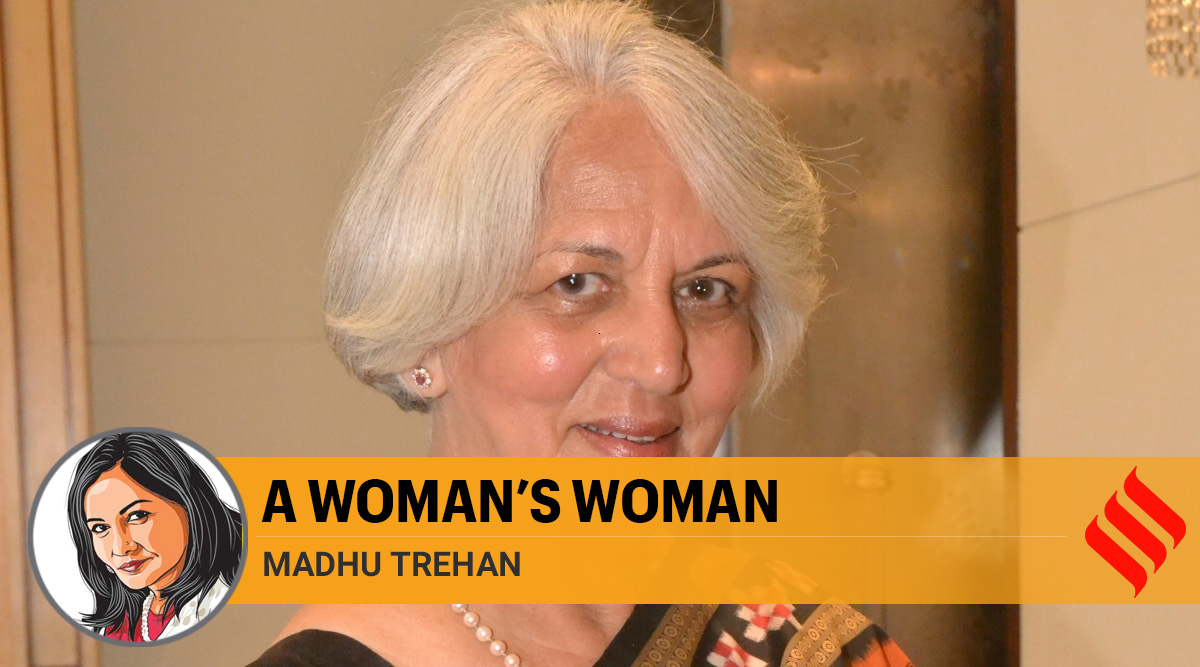 Isher's last public appearance on ICRIER's platform was in February this year at the launch of Montek Singh Ahluwalia’s memoir, Backstage. (File)
Isher's last public appearance on ICRIER's platform was in February this year at the launch of Montek Singh Ahluwalia’s memoir, Backstage. (File)Grief is possibly the most personal and lonely of all emotions. In sharing it, one fears losing its depth that you want to preserve forever. But after reading all the tributes to Isher Ahluwalia, I feel compelled to bring forward essential components of her persona. All that has been written about her professional achievements, her determined academic adventures starting from a financially challenged background to scoring all her goals, is an important message for today’s youth in similar predicament. That story cannot be shared enough. But, for those who had the privilege of knowing her personally, what she brought to her relationships will remain as the most indelible, extraordinary part of her.
Ahluwalia was a woman’s woman. A true feminist does not compete with men. Yet, the camaraderie she shared with women was rich and fulfilling. Notwithstanding her breaking the glass ceilings in the bastioned macho world of economists, Ahluwalia enjoyed and revelled in what can be called “feminine” areas. Despite being a high achieving working woman, her focus on motherhood was as crucial to her as her profession. We were of the generation when the bulk of parenting was the responsibility of the mother. And, there was great joy and humour in it. Keeping in mind her formidable intellect and the usual political discussions, there was a side to her where she was as enthusiastic in talking about parenting, grandchildren, sarees, and yes, hair. She was determined to look her best through her radiation treatments and planned her African themed turbans and caps. She turned to her love of Hindustani classical music and Gurbani while recovering from tough cancer treatments. She was a magnet to young professional women. It was no surprise to me that a young dentist has a wall with Ahluwalia’s article clippings in her clinic dedicated to her. She told me that Ahluwalia was like a mother to her.
Our relationship then spanned three generations when our children then grandchildren became friends. Ahluwalia would take the little ones for a meal to the India International Centre and paid as much attention to their views on subjects as she would to serious intellectuals. She spent valuable time with her grandchildren and often included mine. She mentioned the joy she felt when my granddaughter called her “dadi”. At one of the grandchildren’s birthday parties, she roundly ticked off a magician, who in the midst of his magic show, blithely made a comment about girls that she deemed as sexist. Even many feminists would have simply ignored it to keep a “happy” atmosphere at a kid’s birthday party. Not her. She roundly educated that hapless magician. Her grandchildren will grow up with her unmistakable influence even though she may not be physically present.
When her son was getting married, she told me how delighted she was to have another woman in her house after living with her brood of three men. Ahluwalia invested in her relationships. It is not by accident that her list of friends is long and deep, spanning around the world. Despite debilitating treatments, she travelled with her husband to other cities for his book events. She was determined to experience every moment to its fullest despite the challenges of being in the midst of treatment. In Delhi, in February this year, she was the undisputed star at her husband’s book launch, her bravery outshining all of the political and economic discourse. After the book launch, friends joined them at their home for dinner. There, I went into shame-faced shock when she had her husband read out, in public, three pages she had written about me. It was totally undeserved. She saw more in you than you really were.
Ahluwalia loved being a woman. I do believe, that her articles about water conservation, sanitation, waste management, though based on a foundation of economic research, were always solution oriented and that to me, is intrinsically feminine. She connected with other women because she loved the feminine in herself and in other women. She totally got the rolling of the eyes we women do when we say, “Men”! She genuinely celebrated the success of other women. She loved that the new normal was that women worked and were great mothers. She was delighted that today’s young women could take for granted what our generation had to fight for. I don’t recall her ever extolling “what we had to go through”. She simply rejoiced in the present.
Isher knew she was leaving this world. She called me to talk about her book. It is my favourite memory, that I spontaneously and now I think appropriately, sat on the carpet at her feet as she narrated her life story to me. She decided she was going to finish her autobiography, courageously pulling it together despite extreme health challenges. By gifting her book to the world, she bequeathed her strength to all those who loved her to hang on to. A woman’s woman. Isher was that. Tat Tvam Asi. Thou art that.
The writer is a journalist
📣 The Indian Express is now on Telegram. Click here to join our channel (@indianexpress) and stay updated with the latest headlines
For all the latest Opinion News, download Indian Express App.